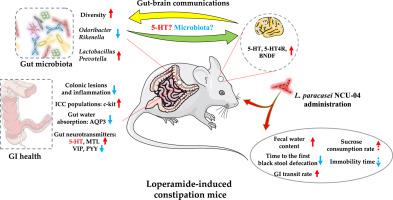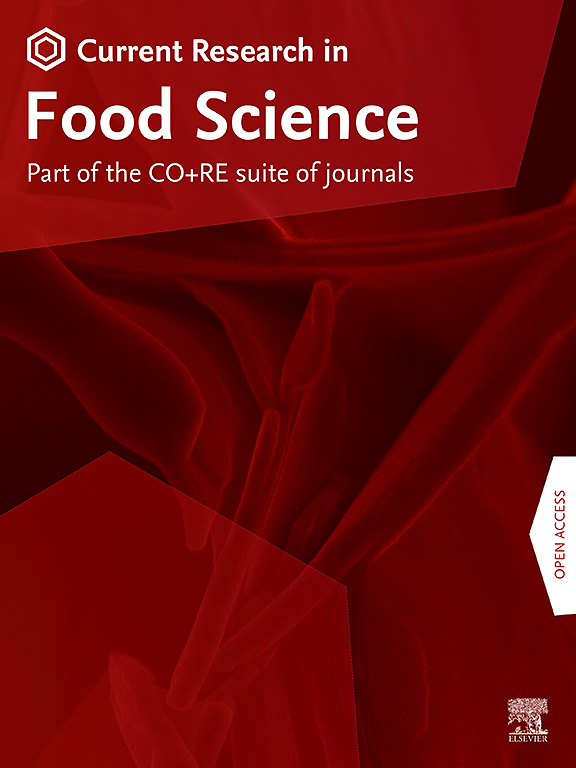副酸乳杆菌 NCU-04 通过微生物组-肠-脑轴缓解小鼠便秘和洛哌丁胺诱发的抑郁样行为
IF 6.2
2区 农林科学
Q1 FOOD SCIENCE & TECHNOLOGY
引用次数: 0
摘要
便秘是一种常见的肠胃疾病,严重影响患者的身心健康,但目前的治疗方法往往缺乏安全性和有效性。新的证据强调了微生物群-肠-脑轴(MBGA)在控制便秘中的关键作用,为益生菌作为改善便秘症状的辅助治疗铺平了道路。在这项研究中,我们分离出了一种肠道益生菌株--副乳酸杆菌 NCU-04,并研究了它对洛哌丁胺诱导的小鼠便秘的改善作用。研究表明,副酸乳杆菌 NCU-04 具有优异的益生菌特性,包括生长旺盛、抗菌和抗氧化能力强、体外无溶血活性等。服用副大肠杆菌 NCU-04 能有效改善排便相关指标,如粪便含水量、第一次排出黑便的时间和肠道转运率,这表明便秘小鼠的肠道活动能力增强。此外,副大肠杆菌 NCU-04 还能明显减轻洛哌丁胺诱发的结肠炎症。此外,副大肠杆菌 NCU-04 还能提高结肠运动蛋白、5-羟色胺(5-HT)和 c-kit 的水平,同时降低水囊蛋白 3、血管活性肠肽和 YY 肽的水平。值得注意的是,L. paracasei NCU-04 能有效上调便秘小鼠大脑中 5-HT 及其受体(即 5-HT4R)的表达。高通量测序显示,副大肠杆菌 NCU-04 恢复了受洛哌丁胺干扰的肠道微生物群的多样性和组成,并显著提高了粪便中普雷沃茨菌属和乳酸杆菌属的相对丰度,同时降低了奥德菌属、利肯菌属和副乳菌属的相对丰度。重要的是,副酸乳杆菌 NCU-04 还能有效改善与便秘相关的抑郁样行为,这可能是通过 5-HT 介导的 MGBA 实现的。这些结果表明,副大肠杆菌 NCU-04 可能为治疗便秘及其相关抑郁症状提供了一种很有前景的方法,支持其作为功能性食品或辅助疗法促进人类健康的潜力。本文章由计算机程序翻译,如有差异,请以英文原文为准。

Lacticaseibacillus paracasei NCU-04 relieves constipation and the depressive-like behaviors induced by loperamide in mice through the microbiome-gut-brain axis
Constipation is a prevalent gastrointestinal condition that significantly affects patients' physical and mental well-being, yet current treatments often lack safety and efficacy. Emerging evidence highlights the critical role of the microbiota-gut-brain axis (MBGA) in managing constipation, paving the way for probiotics as an adjuvant treatment to improve constipation symptoms. In this study, we isolated a gut probiotic strain, Lacticaseibacillus paracasei NCU-04, and investigated its improvement effects on loperamide-induced constipation in mice. We demonstrated that L. paracasei NCU-04 exhibited excellent probiotic properties, including robust growth, strong antibacterial and antioxidant capacities, and a lack of hemolytic activity in vitro. The administration of L. paracasei NCU-04 effectively improved the defecation-related indicators such as the fecal water content, time to the first black stool defecation, and intestine transit rate, suggesting enhanced gut immobility in constipated mice. Additionally, L. paracasei NCU-04 significantly reduced colon inflammation induced by loperamide. Further, L. paracasei NCU-04 increased levels of colonic motilin, 5-hydroxytryptamine (5-HT), and c-kit, while decreased that of aquaporin 3, vasoactive intestinal peptide, and peptide YY. Notably, L. paracasei NCU-04 effectively upregulated the expression of 5-HT and its receptor (i.e., 5-HT4R) in the brains of constipated mice. High-throughput sequencing revealed that L. paracasei NCU-04 restored the diversity and composition of the gut microbiota disturbed by loperamide, and significantly increased the relative abundance of Prevotella and Lactobacillus genera in the stool, while decreased that of Odoribacter, Rikenella, and Parabacteroides. Importantly, L. paracasei NCU-04 also effectively improved the depression-like behaviors associated with constipation, possibly through 5-HT mediated MGBA. These results suggest that L. paracasei NCU-04 may offer a promising approach for treating constipation and its related depressive symptoms, supporting its potential as a functional food or adjuvant therapy for human health.
求助全文
通过发布文献求助,成功后即可免费获取论文全文。
去求助
来源期刊

Current Research in Food Science
Agricultural and Biological Sciences-Food Science
CiteScore
7.40
自引率
3.20%
发文量
232
审稿时长
84 days
期刊介绍:
Current Research in Food Science is an international peer-reviewed journal dedicated to advancing the breadth of knowledge in the field of food science. It serves as a platform for publishing original research articles and short communications that encompass a wide array of topics, including food chemistry, physics, microbiology, nutrition, nutraceuticals, process and package engineering, materials science, food sustainability, and food security. By covering these diverse areas, the journal aims to provide a comprehensive source of the latest scientific findings and technological advancements that are shaping the future of the food industry. The journal's scope is designed to address the multidisciplinary nature of food science, reflecting its commitment to promoting innovation and ensuring the safety and quality of the food supply.
 求助内容:
求助内容: 应助结果提醒方式:
应助结果提醒方式:


